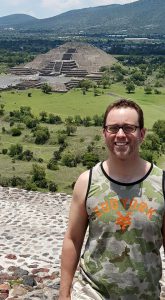The Physical Activity Guidelines Advisory Committee is composed of 17 nationally recognized experts in the fields of physical activity and health. These distinguished individuals agreed to serve on the Committee in a voluntary capacity to review current evidence and make recommendations that will help inform the next edition of the Physical Activity Guidelines for Americans. This post is part of a series of interviews with the Committee members to learn more about the men and women providing independent expertise and service to improve the health of the Nation.
Today, we are highlighting Dr. David Marquez, Director of the Exercise Psychology Laboratory at the University of Illinois at Chicago. On the Committee, Dr. Marquez serves as a member of the Brain Health and Promotion of Physical Activity Subcommittees.

What led to your interest in physical activity?
I was born and raised in Chicago which meant three things: I was a Cubs fan, a Bulls fan, and I grew up playing sports. My family loved playing sports and I did too; I was naturally an athletic child. I became less active in college, but when I went to graduate school for Kinesiology and Behavioral Medicine, I realized that if I was going to be asking other people to be physically active, I needed to “walk the walk” myself. Now I’m physically active on a daily basis, but I can also relate to people who are not lifelong exercisers.
Tell me about some of your recent research
I co-created a Latin dance program to study the impact of regular dance on cognitive function in older, Spanish-speaking adults. Many of my participants have been sedentary for most of their lives. Dancing is both physically and mentally challenging, especially when dancing with a partner. While the effects of exercise on physical health are well-established, the cognitive benefits are an emerging field. In older adults physical activity positively affects mobility and balance, and also decreases the risk of dementia and Alzheimer’s disease.
What tips would you give Americans who are trying to be more physically active?
I think many people know the benefits of an active lifestyle, but do not know how to get started and maintain one. To them I would say:
- Find something you enjoy! Today there are many options for exercise classes compared to even a decade ago. From yoga to upbeat dance classes, there is something for everyone.
- Enlist a friend. Find a partner who also wants to be active and help hold each other accountable.
- If at first you don’t succeed, try again. Even if you can’t stick to a regular workout routine you can still get more physical activity into your daily routine; walking more is a good place to start.
- Some physical activity is better than none, but more is better. Data shows health benefits with some physical activity, but the more you can get the better off you’ll be.
Finally, I think there are real barriers that people are trying to overcome; it is hard to get enough physical activity when you’re afraid to leave your house because of safety concerns. I think it is imperative to not minimize environmental factors, such as weather or safety, when proposing solutions like walking the aisles in a grocery store.
Why were you interested in participating in the Physical Activity Guidelines Advisory Committee?
I believe that the Physical Activity Guidelines Advisory Committee has a unique opportunity to influence people’s health. Furthermore, I’m impressed by the scientific rigor of the process. The Committee’s report to HHS is not an opinion piece — it is driven by scientific evidence and data. This work is tremendously important, and as I become more knowledgeable in all aspects of the field I look forward to sharing what I’ve learned with friends and colleagues.
~
The Office of Disease Prevention and Health Promotion would like to personally thank each of the members for their dedication and service on the Committee. The Committee’s independent review of the scientific literature is the result of thousands of hours of work and will culminate with the submission of the 2018 Physical Activity Guidelines Advisory Committee Scientific Report to the Secretary of the Department of Health and Human Services (HHS). HHS will use the report to develop the next edition of the Physical Activity Guidelines for Americans.